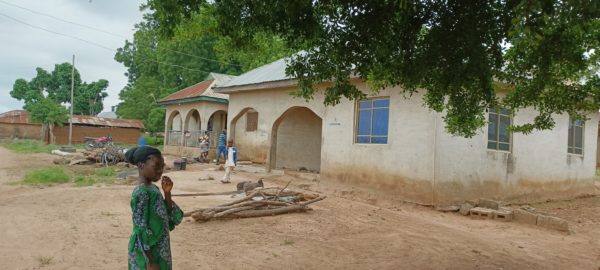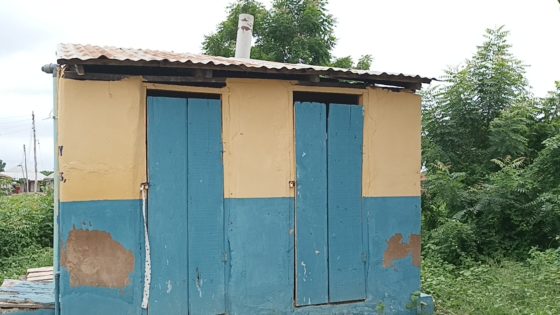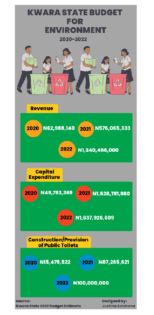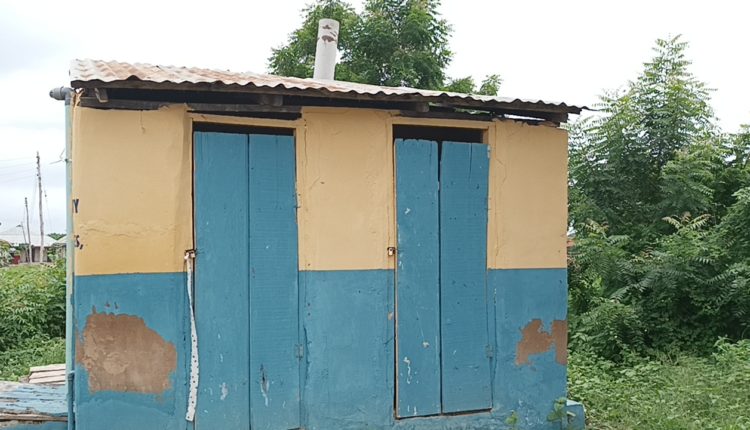Bush Attack: Epidemics loom in Kwara as rural communities still practice open defecation despite acclaimed investments by state govt
The 2021 Water, Sanitation and Hygiene National Outcome Routine Mapping Survey (WASH-NORM) revealed that 50% of Kwara state population practice open defecation. In this report, JUSTINA ASISHANA visited some rural communities in Kwara state where the residents still practice open defecation despite the state government’s sensitization and interventions.
“A mà lo sì wàju ló yà gbé” meaning “we go to the front to defecate”, 40 years old Silifat Saheed in Otte-Oja ward in Asa local government area of Kwara state replied when Solacebase asked her about the toilet facility in her house.
Explaining further, Silifat said that she and her family often go to the nearby bush to defecate whenever they are pressed. She disclosed that the three-bedroom house where she lives with her family of seven has no toilet adding that the majority of the houses in the community have no toilet facility.
“We do not have any toilets. In fact, no house around here has a toilet. Everyone uses the bush,” she said.


Saheed who was preparing fufu (cassava pudding) for sale when this reporter visited said the major challenge bedeviling the community is lack of toilet facilities while stating that access to water is sufficient in the community. “We have water but no toilet. See that place, there is a borehole, across the road, there is another borehole and at the back of that house there is one borehole,” she said pointing to the directions of the boreholes.

Abdullahi Alagbado, a security man in Otte-Oja said only a few buildings in the community can boast of a functional toilet facility. He said the building where he works as a security guard which was built two years ago and a few other modern buildings are the only buildings with toilet facilities.

“Those without toilets in this community are much. Let me say that only the new modern buildings have toilets. Everyone uses the bush when they want to excrete. Even in my house, there is no toilet but my workplace has a toilet.
Alagbado, however, devised a plan. He does his toilet business before leaving his workplace and does not go to the toilet until the next day when he is back to his workplace.

“What I do is that before I go home at night, I try using the toilet. I also try to hold myself till the next morning when I resume work. It is only during weekends that I also use the bush. I enjoy using the toilet in my workplace and wish my house had one but there is no money to install one,” he said.
Open defecation remains a menace in the country with about 47 million people still defecating in the open, making Nigeria the second country with the largest number of people practicing open defecation globally. Nationally, Kwara and Plateau states are the top two states with the highest prevalence of the menace.
Solacebase reports that open defecation has ruined epidemic preparedness of the state government and is one of the predisposing factor for outbreaks of epidemic including cholera outbreak witnessed in the state in 2017.
Between 1 May and 30 June 2017, suspected cholera cases in Kwara State were reported from five local government areas which include Asa (18), Ilorin East (450), Ilorin South (215), Ilorin West (780), and Moro (50).
Not much has changed since then. Visits paid to health centres in rural communities in the state showed that signs and symptoms of cholera and diseases such as diarrhea and dysentery are some of the most sought after treatments by patients. Health workers who spoke with this reporter expressed fear that it was only a matter of time before such outbreak occurs if nothing is done to stop the bad practice.
Community toilet demolished in place of psychiatric hospital
For Budo Egba community in Asa local government, their lack of public toilet facility was a trade-off they didn’t sign up for. The Federal neuro-psychiatric hospital constructed in 2021 was built at the location the community sited a public toilet to discourage residents from engaging in open defecation. The public toilet had to give way and since then there were no plans to provide the community with an alternative.
Sadly, residents have returned to their old habit and now defecate indiscriminately in the open and even coined out a local name for it. According to a resident of the community, Akanbi Ayinde, they refer to open defecation as “bush attack”.
“It means we go to the bush to carry out our toilet business. As you can see this whole vicinity, there is no toilet in this area. The only toilet we had was destroyed when a new hospital was being constructed in the community. There is no toilet here at all and we do not know who to complain to so that it would be rebuilt.”
“We really need toilets in our community. When the public toilets are available, anyone who is pressed will go there and carry out his or her toilet business. We try to keep it clean and neat and it helped us for several years but now, we are back to bush attack,” said Ayinde.
Health workers worried over residents’ adamant nature towards open defecation
The windows of the delivery room in the Basic Health Center, Otte-Oja ward, are always closed whenever they are to attend to patients because of the overpowering stench from the pounds of feces behind the Health Centre’s building.
The Officer-in-Charge, Ibrahim Nurat Ayo explained that the staff in the health facility had to take to planting maize, cassava and vegetables around the bare land of the health facility to discourage the people from coming into the facility to defecate.
Pointing to a building outside the delivery ward, Ayo said, “Anytime we have delivery, we have to close the window because of the stench which is terrible and it would be unhealthy to put someone who is in labour through that type of stench. During the heat season, when everywhere is hot, you won’t be able to stay in this room unless the windows are closed because of the smell that comes into the room. Sometimes when they defecate, they throw it over the fence but it has reduced that a little since we planted some crops,” Ayo said.
She stated that as health workers, they have been trying their best to sensitize the people and make them stop open defecation but the residents have remained adamant and pay no heed to the sensitization exercises and health education given to them.
“This attitude of the people using the bush to defecate is very terrible. In this area, most of them do not have toilets. There was a time I called environmental officers to ensure that toilets are built in the new buildings that are being constructed in the community.
“The environmental officers went round to sensitize them but they did not heed. Even during clinic days, antenatal and postnatal sessions, we talk to them about hygiene, the essence of having a latrine, and how open defecation can impact their health. In this community, they build houses without toilets, we have told them several times but they do not listen.”
One of the staff in the Budo Egba PHC, Abdulkadir Sherifat told Solacebase that the community is in dire need of public toilets lamenting that the destruction of the only public toilet in the community has made the community relapse in its fight against open defecation.
“There is a need for more toilets here. The population in this community is about 14,000 and imagine that almost all of them openly defecate, you can imagine how bad it is. That is why they do not clear the bushes because it gives them shade while they are doing bush attack,” said Sherifat.
Sherifat provided more insight into how the term “bush attack” was coined. She explained that residents either excrete in nylon and throw it into the bush or enter into the bush to defecate.”
In places where toilet facilities exist, maintenance has been a huge problem. At Ogele PHC, in Asa local government area, health workers said they locked up the public toilet donated to the facility by students of the Kwara State University (KWASU) because of misuse and lack of maintenance despite series of sensitization programme conducted in the community.
A health worker at Ogele PHC, Mrs. Jimoh Kuburat explained that the public toilet and an incinerator built by the students were poorly maintained and later vandalized before the hospital decided to lock it up.

“The problem here is that most of the homes do not have toilets. They do bush attacks which is very common and that is done anywhere. Some group of students from KWASU built a set of toilets to encourage the people to stop open defecation but after three days, we saw that the tap and the pipes have been destroyed. This is why we lock it.
“We have sensitized them several times, alongside environmental officers, to build pit latrines in their houses if they cannot go for the water system toilets but all these have fallen on deaf ears. They still continue with their bush attack.”
One of the patients receiving treatment at the PHC, Sunday Afolabi said the house where he lives have only one toilet servicing ten flats.

“When I first came to this area, I noticed a lot of people defecating in the bush but I didn’t join them. Later, I had no choice than to join them. My house has only one toilet catering for 10 persons and so when I want to use the toilet and someone else is there, the only solution will be to go to the bush to defecate,” he said.
The Officer-in-Charge of the PHC in Tapete Community, Audu Fumilayo said that the people do not adhere to the health educators and environmentalists advice who come around to sensitize.
“In this community, they build their houses without toilets. Why should you build a house and not put a toilet in it? I always ask them. You will see a house with ten rooms and no toilet. The one that has toilets will have only one. How can one toilet serve about 20 people in a house? This community seriously needs public toilets to help them stop open defecation,” she said.
Government Interventions toward ending open defecation
The Kwara state government is making efforts to tackle the menace of open defecation in the state. Alongside other state governments, the state government has rolled out a campaign to put an end to the practice of open defecation in Kwara state. The campaign tagged “Clean Kwara Campaign” is intended to run from 2020 to 2030.
The state government is also partnering with Federal Government-led initiatives such as the Partnership for Expanded Water Supply, Sanitation and Hygiene (PEWASH) and Open Defecation Free (ODF) campaign.
In 2020, Kwara State Government took delivery of 1000 flush toilets from private sector stakeholders in its project towards ending open defecation by 2025. The Governor, AbdulRahman AbdulRazaq said that the flush toilets will be deployed in all local government areas of the state to boost good hygiene.
In a statement by the state Ministry of Environment in 2021, residents of Kwara state were told that housing projects would be approved if there is no provision for toilet facilities adding that the ministry plans to work with the Physical Planning Authority to ensure that the directive is not flouted.
The ministry via the statement also warned residents of the state to shun open defecation and classified it as one of the dangers and threats to human lives in the state. In enforcing the directive, the Kwara State Environmental Protection Agency (KWEPA) sealed a residential building in the Agba-dam area of the state in 2021, for lack of toilet facilities for tenants living in the house.
It was learnt that the General Manager of KWEPA, Sa’ad Dan-Musa gave the directive after the landlord failed to adhere to the notices that had been previously issued to him. It was stated that the action of the landlord contravened the fight against open defecation which is a threat to environmental health.
Read Also: INVESTIGATION: Poor registration, communication, abuse, others bedevil Kwara Health Insurance Scheme
For the Partnership for Expanded Water, Sanitation and Hygiene (PEWASH) project, N250.8 million was budgeted in 2021 out of which N150.8 was expended from January to September 2021. However, in 2022, there was no capital expenditure for PEWASH in the state.
In the 2022 budget, the state government budgeted N2,221,900,455 for capital expenditure for the Ministry of Environment. From this sum, N1,637,926,609 was allocated for environment protection, and N100 million budgeted for construction and rehabilitation of public toilets.
N1.722 million was budgeted for Water, Sanitation and Hygiene (WASH) programmes, N42.433 million was budgeted to be expended in 2021 but no amount was budgeted in 2022.
Also in 2022, the government budgeted N100 million specifically for the construction and provision of toilets. In 2020 and 2021, N15.4 million and N12.2 million was allocated respectively for the same budget item.
Despite these programmes and interventions by the state government, there is no visible impact on the people as rural communities across the state still practice open defecation. Findings showed that majority of the programmes and interventions are focused on the urban and semi-urban areas of the state.

We are no longer at the bottom of open defecation indices – Environment Commissioner
The Kwara state Commissioner of Environment, Remilekun Banigbe has said that current indices on open defecation released in the second week of July showed that Kwara state is no longer at the bottom in the ladder of open defecation.
When asked to provide documents to back the statistics up, the Commissioner denied the reporter access to the report stating that it is publicly available. Efforts to get the document proved abortive as the report is not available online.
According to the Commissioner, the government has gone out in full force to combat this menace which has become embarrassing to the state government adding that several Ministries, Departments and Agencies are putting in efforts to address open defecation in the state.
“All hands are on deck to keep on moving up this ladder. Recently, the Governor committed N150 million into WASH activities. For the provision of public toilets, we are not only focusing on the state capital but also the rural communities so as to ensure that in every corner, there is a public toilet in Kwara state. All stakeholders are coming together to ensure that open defecation comes to an end in the state. We are proud to say that these interventions have paid off as we have moved up the ladder based on these steps and interventions we have taken,” she stated.
Banigbe also said that last year, over 15 premises were sealed over the unavailability of toilet facilities while several warning notices were sent to houses without toilet facilities.
“We have met with the Magajis of major areas to get their support in getting houses that do not have toilets to ensure that they build one so that the era of people defecating in the open comes to an end. We started mandating house owners to build toilets along with the house they are building. Without a toilet space being made in your building plan, it will not be approved,” she stated.
Government Need to Act Fast – Health Experts
The Executive Director of a Civil Society Organisation, Media Advocacy and Technologies Center, Musa Aliyu told Solacebase that the open defecation behaviour of residents in Kwara communities is appalling adding that even in the township of Ilorin, there are households without toilet facilities.
“Even markets, some critical markets in Ilorin today don’t have good toilet facilities and this is where as many as 1000 people converge daily to transact businesses. It is quite unfortunate. Communities in rural areas do not even know what a toilet is all about.
“Every community and household are meant to install modern toilet facilities to avert the outbreak of epidemics. Unfortunately, the level of sensitization, and acceptance of modern facilities of toilets, is very low.
“We went to a particular community and they told us that what they are using as toilet facilities is just a big drainage that passes behind their household and that was what was used by their grandfather and they do not intend changing it in the nearest future. This is calamitous.”
He called on the state and federal government to increase sensitization against open defecation and educate residents more on the hazard of such a habit to the health of the community.
Oluwasegun Oluwagbemiga, a health management specialist in Ilorin said that the government need to provide more mobile toilets and put up signs in English, pidgin and local dialects to sensitize the people on proper toilet behavior whilst ensuring that defaulters of open defecation are adequately sanctioned.
This publication is produced with support from the Wole Soyinka Centre for Investigative Journalism (WSCIJ) under the Collaborative Media Engagement for Development, Inclusion and Accountability project (CMEDIA) funded by the MacArthur Foundation.



Comments are closed.